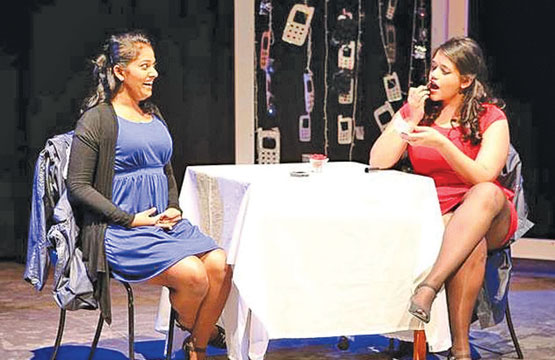|
Dead man's cell phone:
Digitally bound beyond the grave
Reviewed by Dilshan Boange
Grappling issues on identity, individuality, privacy and the nature
of relationships in this intensely digitalising era through the play
Dead man's cell phone by Sarah Ruhl, Sri Lankan drama directress Anushka
Senanayake proved her prowess to deliver a good quality full length
theatre production to theatregoers.
|

A scene from the play |
Seated in the gentle darkness at the British School auditorium I
witnessed a remarkable show of thespian talent bring to life a US play
that was well appreciated by Sri Lankan theatregoers. The opening
announcement that came over the public address system welcoming patrons
got interrupted with a cell phone ringtone and thus the all too familiar
request to put cell phones on silent mode or switch them off was made.
One astounding truth about the show was that it is the only stage
play I have yet watched, after the cell phone's advent to the category
of an ordinary mundane utility, where a cell phone did not ring during
the show and cause that much resented annoyance!
By looking at the sequence of scenes, the play as a whole in terms of
its storyline and dialogue narrative was one which seemed to be possible
to dramatise as a performance of the realism mould.
But unless of course the script by Ruhl stipulated the direction to
be of the nature of what was performed, the directress seems to have
played with elements that blended threads of the surreal and using
elements that brought in a facet of miming and dancing, I felt the work
also brought out a sense of what may be 21st century 'indie' art.
Innovativeness
The level of innovativeness in the vision of the directress was
evident. The single background prop had a very symbolic function to it
rather than serving the purpose of a realistic stage set. The visibly
onstage stage hands who shifted the props around and doubled as the mime
like performers dressed in black added an element of the surreal.
The music signalled in certain ways shifts in the scene's thematic
essence. An example is where the 'deadness' of the dead man -Gordon, is
established, and before the narrative moves to the point of Gordon's
mother Mrs. Harriett Gottlieb eulogising at the funeral service, music
that is of the likeness of 'Gregorian chants' flowed in. The other songs
and music used were very much of the contemporary kind and added to the
performance's texture of western modernity.
|

Anushka Senanayake |
Gordon's first words are cut off with darkness that ends the first
half of the play for intermission. It was a powerful measure to thrust
the image of the dead man on the viewer's mind. A man who is at the
centre of the plot but doesn't speak until that moment. His first word
uttered -"I" gets cut off as if symbolically the darkness that 'floods
in' kills Gordon.
The suspenseful effect it creates is almost as if what one may feel
if Beckett's Godot actually arrived only to have the curtain descend
without any explanation given as to why everyone waited for him! The
stifling of a person's speech is in some ways the killing of his being
(within).
Chalana Wijesuriya delivered a compelling performance through which
attributes as unapologetic selfishness, brash 'self centrism', and
condescension characterised Gordon as a 'living person'. I say so
because the play delivers a powerful portrayal of the politics of
characterisation in terms of who a person is in his own voice and is
'made to be' through the words of others.
Acting talent
Played endearingly by Dinoo Wickramage with admirable acting talent
mercurially moving between expressions that were theatrically sharp;
Jean, the timid and modest self effacing young woman who good-heartedly
becomes the agent who crafts the character of Gordon after his death
shows what power an 'agent' or a representative, be self appointed or
otherwise, can wield over the absentee.
How much of our 'self', our 'character portrayal' do we surrender on
a daily basis to 'agents', to 'reps' who may at times be institutionally
designated to do so, or may be requested by us to do so for necessity?
How much of those 'reps' give life to the actual person whom they claim
to speak for?
Man is always haunted by mortality. And in consequence what arises to
some would be the dilemma of what their legacy left in the memory of the
living, may be.
In the case of Jean, she represented that element of goodness in
society that believes in using opportunity for sincere good, by making
the wife, mother and brother of the deceased Gordon whom she had never
spoken a word with, feel good about their lost loved one and themselves
in light of what they meant to the deceased.
But it is all fictitious. Jean is the perpetrator of a fallacy to
achieve a salutary outcome for the living while constructing an
imaginary character that her intrigue causes her to develop a love for.
Digital age
The story is rather telling of how the digital age creates greater
pursuits of escapisms for people who find their lives becoming more and
more 'atomised' through lack of interpersonal connectivity.
ICT today can distance us as much as it connects us. It can create
illusions of connectivity with room for subjective interpretations in
ways that cause horrendous misreading.
Jean shows the duality in us that wants to drift in flights of
imagination and also yearn for what is true to life and real to the
touch. Her own creation called Gordon and the sting of stories she
concocts pretending to be a colleague of the dead man, shows how she
romances with the idea of fantasy.
At the point where she visits the stationary shop where Gordon's
brother Dwight works and drifts meditatively to the feeling of caressing
various kinds of paper and says each feels different like 'leaves' or
'branches' and says heaven must be like an embossed invitation card, she
shows how the thing affirms to us the physical truth of our existence in
this world -the touch speaks to our senses in a truth truer than words.
Sulochana Perera who played Mrs. Gottlieb lived up to her role
convincingly as did Tasmin Anthonisz as Gordon's widow Hermia, while
Shazad Synon brought to life a soft spoken man with inhibitions whose
character complemented Jean's.
An interesting point to note is Gordon and Hermia speak of hidden
desires about indiscretions while in bed together.
Hermia's feeling of being no longer desired by her husband had led
her to fantasise that she was her own husband's mistress whom he would
enjoy being intimate with, to delude herself to think she is
appreciated.
Dualities in human self perceptions are undeniable. Self deception
can be a powerful thing. But who in fact would Hermia be in such a
dichotomised scenario? The story thus also speaks of secret tribulations
and insecurities people face in their relationships, one of the most
telling lines being when Gordon tells Jean, in the ethereal plane, 'you
must be careful whom you fall in love with'. Jean as I saw her is an
agent for 'love construction'. She wanted to create impressions of love
for, and of, Gordon in relation to his family members. Her agile
thinking and clever word crafting wittiness enables her to sound as a
believable source of 'revelations'.
This role she assumes also reveals her ability to speak with a poetic
touch. When Jean tells Hermia that Gordon, despite his indiscretions,
loved her and had said of Hermria -'She walks in, and time stops' it had
a powerful lyricism to it that struck me as a line which resonates the
feel of what one encounters in Michael Ondaatje's The English Patient;
in the likeness of a line the Count Almasy may say reposing
motionlessly, speaking of his lost love.
When Sri Lankans go to the theatre they like to laugh, I was once
told by actor Gihan de Chickera. Comedy is mostly what works here in
terms of becoming a commercial success. But Dead man's cell phone isn't
really a comedy intended to tickle your ribs and cause fits of laughter.
Although Mrs. Gottlieb says, "I keep forgetting he's dead" in the
flow of some mild amusing dialogue with Jean, Sulochana Perera delivered
that line with a staid and desolate face.
Yet some laughter arose from the audience to that particular line.
How much of the 'darkness' in a 'dark comedy' do Sri Lankan's
appreciate? How much of it do we digest and make part of our after
thoughts?
Social transformation
Theatre's potential to be a catalyst for social transformation and
not serve as entertainment alone lays greatly in the perceptiveness the
audience has to the nuances that are messaged as part of the subtext,
created partly through tone and expression.
In that sense, whether the Oscar winning American Beauty qualifies as
a film with an aspect of 'comedy' in it, in the eyes of many Sri
Lankans, could be asked in this context of gauging our collective
reception to 'dark comedy'.
Anushka Senanayake and her theatre company, despite being
comparatively young in the Sri Lankan English theatre circuit, show
immense potential. Dead man's cell phone may perhaps be viewed as an
'amateur production' on account of the visible 'youngness' of the
players; but that is due to 'physiology'.
There is no denying the calibre of the talent that unveiled on stage.
The production was for certain, a triumph. |


